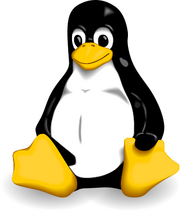
Tux, the Linux penguin.
Linux refers to the family of Unix-like computer operating systems using the Linux kernel. Linux can be installed on a wide variety of computer hardware, ranging from mobile phones, tablet computers and video game consoles, to mainframes and supercomputers. Linux is the leading server OS, accounting for more than 50% of installations. Desktop use of Linux has increased in recent years, partly owing to the popular Ubuntu, Fedora, and openSUSE distributions and the emergence of netbooks and smartphones running an embedded Linux.
The development of Linux is one of the most prominent examples of free and open source software collaboration; typically all the underlying source code can be used, freely modified, and redistributed, both commercially and non-commercially, by anyone under licenses such as the GNU General Public License. Typically Linux is packaged in a format known as a Linux distribution for desktop and server use. Linux distributions include the Linux kernel and all of the supporting software required to run a complete system, such as utilities and libraries, the X Window System, the GNOME and KDE desktop environments, and the Apache HTTP Server. Commonly used applications with desktop Linux systems include the Mozilla Firefox web browser, the OpenOffice.org office application suite and the GIMP image editor.
The name "Linux" comes from the Linux kernel, originally written in 1991 by Linus Torvalds. The main supporting user space system tools and libraries from the GNU Project (announced in 1983 by Richard Stallman) are the basis for the Free Software Foundation's preferred name GNU/Linux.
| This page uses Creative Commons Licensed content from Wikipedia (view authors). |
